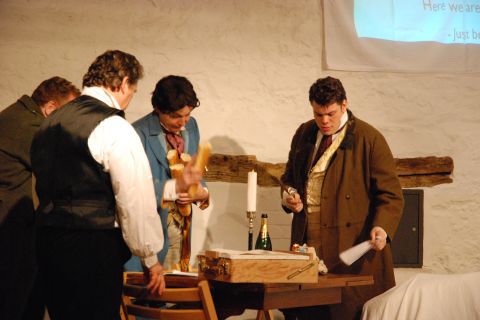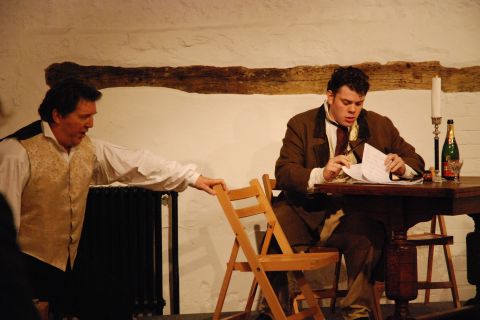|
<<< << -- 5 -- Roderic Dunnett A GODSEND -- >> >>>

This was a Bohème brimming with life. What we saw and heard, accompanied by piano yet to terrific effect, was the result of a highly proficient team effort: Dean Taylor oversaw the stage direction sensibly, moving the lead singers tidily and economically while working within quite constrained limitations. Everything was clearly visible. A small raised acting area was made to serve a range of moods and purposes: the liveliness and bustle of the garret, the cheerful burning of Rodolfo's play, the mock-wooing with a buxom Marcello kitted up in headscarf, Schaunard and Colline's mock-battle with French bread, the Café Momus scene, the bust-ups and reconciliations of Marcello and Musetta, and the tender exchanges, initially so optimistic, between Rodolfo and the ailing Mimi.

Colline (hidden, at rear), Marcello, Schaunard and Rodolfo in their sparsely furnished students' garret. Photo © 2007 Sebastian Fattorini, Skipton Castle
|
The brains behind this enjoyable, eye-catching production is the hard-working Artistic Director of Heritage Opera, Chris Gill, who studied at Birmingham University -- at whose Barber Institute the music and opera department presents thoughtful stagings with the accent on Baroque and Classical repertoire -- and who is now the conducting force behind several capable choirs and orchestras in the North West.
Gill knows how to conduct effectively, producing clarity and detail with a minimum of extraneous flurry, rightly judging that the informality of the occasion calls for efficiency and smooth precision rather than any preening or display. Indeed he conducted and gave precise leads from beside the piano, while page-turning for his busy keyboard player, Paul Greenhalgh, as well as intermittently overseeing set, props and video recording, and (amazingly) controlling the spot-on surtitles as well.

The thoughtful Marcello (David Palmer, left) and a reflective Rodolfo (Richard Williams, right, at workdesk) in Heritage Opera's 'La Bohème'. Photo © 2007 Sebastian Fattorini, Skipton Castle
|
This was a well-driven Bohème, spacious but never self-indulgent: indeed the pacings Gill chose seemed invariably both friendly to the singers and advantageous to the opera. One can remember only a handful of Bohèmes that passed so naturally and easily: there seemed a naturalistic flow to the evening, which belied and offset the artificial cramping of the singers on stage.
Musically, the evening was a rip-roaring success, and apart from Gill's overall management much of this was owed to Paul Greenhalgh's sturdy accompaniment. Here was a patently safe pair of hands: a characterful but never showy pianist who was capable of drawing from a plain but pleasant-sounding instrument a wealth of varied timbres. When the soldiery passed, one sensed drums and fifes tickling one's spine; at quieter points, the piano withdrew, acquiring the silken hues of a clavichord or muted harpsichord; yet at the more boisterous moments, as the garret occupants cavorted and sparkled for their own amusement or Mimi's entertainment, the room was filled with a rich palette of sound, and warmth and rich colours suffused the auditorium.
When the music really scampered, Greenhalgh cheekily gave it the fluent feel of a Scarlatti sonata or a Czerny exercise, a bit like Miles twiddling away in Britten's The Turn of the Screw. On no occasion was the vocal line sacrificed to the excessive pounding that in Puccini -- in Il Tabarro, for instance, or parts of Turandot -- sometimes upsets the delicacy of the orchestral accompaniment. La Bohème with just a piano? But contrary to expectation, so much emerges as a result: elements of impressionistic detail, or the subtle way in which Puccini makes his material -- not merely the recurrent big melodies -- slyly resurface in a slightly different guise so as to do additional service in a later act.
Continue >>
Copyright © 15 April 2007
Roderic Dunnett, Coventry UK

|

